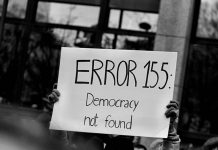The political left, like the political right, is comprised of various groups that do not always agree, and as such, it is often unfair to lump ‘the left’ together as if it were one unified school of thought. It should go without saying that when someone says ‘the left,’ they are referring to a thought that is more or less dominant on the left, and not to everyone who is on the political left, and there are various thoughts that do dominate leftward political circles. Most of these dominant ideas fall into a categorial envelope known as postmodernism.
According to postmodernism, people are naturally tribal. Tribalism drives us into identity groups. Identity groups compete for power, and as such, politics is invariably based on identity.
Because identity groups are in a constant struggle against one another for power, people, if left free, will oppress one another. Freedom is, quite literally, the cause of oppression. As such, freedom is not a value just people should strive toward. Freedom, even more than money, is the root of all evil.
Some postmodernists, like Richard Spencer, believe that culture and race are inseparable. Richard Spencer believes that different races should be separated into different societies, but most postmodernists reject this view, on the basis that people would only find other identity groups to associate into: blue eyed people vs green eyed, red heads vs blondes, etc.. Not only that, but postmodernists believe that having different races in different countries leads to nationalism, and war. To avoid war, most postmodernists seek to mix all races together into a single society.

The solution, according to most postmodernists, is to separate out a moral and intellectual elite, from the identity group structure, and to invest in this group all power. This group can then squeeze those at the top of the oppression matrix down, while simultaneously lifting those at the bottom of the matrix up, until all people are equal. Identity groups will become oppressive again if ever made free, so the moral and intellectual elite must have all power, forever.
I’ve seen a number of people compare postmodernism with nihilism, but nihilists view suffering as the central constant of the human condition, whereas postmodernists view oppression as that central constant. Postmodernists, then, focus on forced-equity as the solution to oppression, whereas nihilists focus on the end of human existence as the solution to suffering. The two philosophies have a great deal in common, and both are anathema to enlightenment values, but they are not the same.
That said, most nihilists are also postmodernists who view oppression as one of the forms of suffering existence forces upon us. Nihilists, however, want to end existence to wipe out suffering, and most postmodernists do not want to do that.
Dylan Klebold was a nihilist. Dylan Klebold left a detailed journal before he and Eric Harris committed one of the worst school shootings in American history, in Columbine, Colorado. Klebold wrote that his one regret was that he and Eric Harris would only be able to kill the students in Columbine High School, when what they really wanted to do was to end all human life, everywhere on Earth. Ending human existence, Klebold believed, would end suffering, and while Klebold and Harris were happy to end the suffering of their schoolmates, they would have preferred to have ended all suffering everywhere, by eradicating humanity from the face of the Earth.
Nihilism is suicidal, but it is an especially pernicious form of suicide in that nihilists want to take other people with them. Nihilism would be much less problematic if the nihilists just wanted to end their own suffering, but sadly, they do not want to leave the rest of us alone.
People often compare postmodernist views on identity groups to racism. The two things have more in common than they have separating them, but again – they are not the same. Racists view race as something that makes some people superior to others. Postmodernists believe that race is a defining characteristic, and they believe that different races invariably compete for power, but they do not believe one race is better or worse than another. Postmodernists believe that different races compete for dominance whenever people are left free, which is very similar to racism (and just as evil), but it is not quite the same thing as racism.
I find that the anti-capitalism narrative in postmodernism comes from the fact that capitalism limits neither success, nor failure. Some people find the notion that some may fail miserably, in free markets, while others do unbelievably well, to be a moral ‘bridge too far.’ This seems to be a dominant thought among postmodernists.
The left used to be content with a social safety net as a protection against failure, but postmodernist philosophers attack success as well as failure.
The narrative now is that success and failure are entirely determined by things that are outside the control of the individual, and that as such, it is unjust for some to do well while others do poorly.
An an example.. If someone is smart – they were born smart, purely out of luck. They did nothing to earn intelligence, and thus have no right to benefit from it over someone who, through no fault of their own, is not smart.
If someone is hard working, their work ethic is part genetic, and part an inheritance of their parenting. Since this person earned neither the genetics, nor the parenting, that gave them a good work ethic, they have no right to benefit from it over someone who, due to no fault of their own, is lazy.
If someone has an education, then that education is partially a form of inherited wealth, partially the result of genetics (intelligence, etc.) and partially the result of societal help (teachers, etc.). This person did not really earn their education, as all of the things that went into it – including the ability to put forth the effort needed – was unearned. As such, the educated have no right to benefit from their education over those who are uneducated.
To today’s left, everything is based on luck, and it is unethical to allow some people to be wealthy when others are poor, when everything that contributes to both wealth and poverty, is the result of some cosmic game of chance.
There is nothing anyone can ever have, or do, that a postmodernist cannot attribute to genetics, parenting, society, or something else they will say is outside an individual’s control. Everything is luck, including skill, and as a consequence nothing is earned, and nothing is deserved. Those who have should feel guilty, and those who do not have should feel outraged.

According to the same modern philosophers, there is plenty of wealth in the world for us all to survive with some modicum of comfort, as long as we share that wealth equitably. The only moral choice we can possibly make is to share everything with everyone.
Also, being born in one nation over another is purely based on luck – nobody chooses the place or condition of their birth – so it is grossly unfair that some nations are more wealthy than others, or that some people live in one place rather than another. Wealthy nations should pay to move anyone wherever they want to live, and should take care of all of those people’s basic needs once they get wherever it is that they want to go.
And from there, capitalism is evil, and must be eliminated, even if death and depravity are the only other options. Socialism is a moral imperative to the postmodernist, and the morality involved is vastly more important than such notions as what does, or does not, work.
Postmodernism is a complete rejection of the enlightenment. Postmodernists reject the cultures and values that grew out of the enlightenment, and postmodernists hate the religions (primarily Christianity, but also Judaism) that gave birth to the enlightenment.
Note that truth, reason, the scientific method – all of these things came from the enlightenment, and are rejected under postmodernism. We all have our own facts, and the reasons to pick some facts over others, or to use reason in a debate – the only purpose of doing so is to perpetuate one’s own identity group over others. As such, each identity groups has its own ‘facts’ and ‘truths,’ and the ‘facts’ and ‘truths’ of the more oppressed groups are the only ones that matter.
Nobody can prove what does, or does not, work, without relying on facts, truths, and logic. Facts and truths are subjective, and logic only exists to perpetuate the current, oppressive Western patriarchal structure. Who is to say that Venezuela is starving? Who is to say that socialism does not work? Capitalism works great when you have white privilege, but what about everyone else?
See how easy that is?
This is the heart of the postmodernist world, and it is almost as uplifting as it is logical.




















